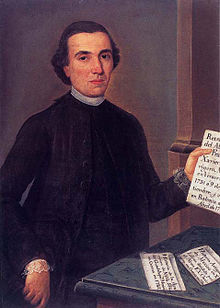Francisco Javier Clavijero
| Francisco Javier Clavijero | |
|---|---|
 |
|
| Born |
Francisco Javier Clavijero Echegaray September 9, 1731 Veracruz, Mexico |
| Died | April 2, 1787 (aged 55) Bologna, Italy |
| Occupation | priest, teacher, scholar, and historian |
Francisco Javier Clavijero Echegaray (sometimes Francesco Saverio Clavigero) (September 9, 1731 – April 2, 1787), was a Novohispano Jesuit teacher, scholar and historian. After the expulsion of the Jesuits from Spanish colonies (1767), he went to Italy, where he wrote a valuable work on the pre-Columbian history and civilizations of Mesoamerica and the central Mexican altiplano.
He was born in Veracruz (Mexico) of a Spanish father and a Criolla mother. His father worked for the Spanish crown, and was transferred with his family from one town to another. Most of the father's posts were to locations with a strong indigenous presence, and because of this Clavijero learned Nahuatl growing up. The family lived at various times in Teziutlán, Puebla and later in Jamiltepec, in the Mixtec region of Oaxaca.
Clavijero's biographer, Juan Luis Maneiro, wrote:
From the time of his boyhood, he had occasion to deal intimately with the indigenous people, to learn thoroughly their customs and nature, and to investigate attentively the many special things the land produces, be they plants, animals or minerals. There was no high mountain, dark cave, pleasant valley, spring, brook, or any other place that drew his curiosity to which the Indians did not take the boy to in order to please him.
He began his studies in Puebla, at the college of San Jerónimo for grammar, and the Jesuit college of San Ignacio for philosophy, Latin and theology. Upon completion of these studies, he entered a seminary in Puebla, Puebla to study for the priesthood, but he soon decided to become a Jesuit instead. In February 1748 he transferred to a Jesuit college in Tepotzotlán, State of Mexico. There he continued to study Latin and also learned ancient Greek, French, Portuguese, Italian, German, and English. In 1751 he was sent back to Puebla for further studies in philosophy. Here he was introduced to the works of such contemporary thinkers as Descartes, Newton, and Leibniz.
...
Wikipedia
